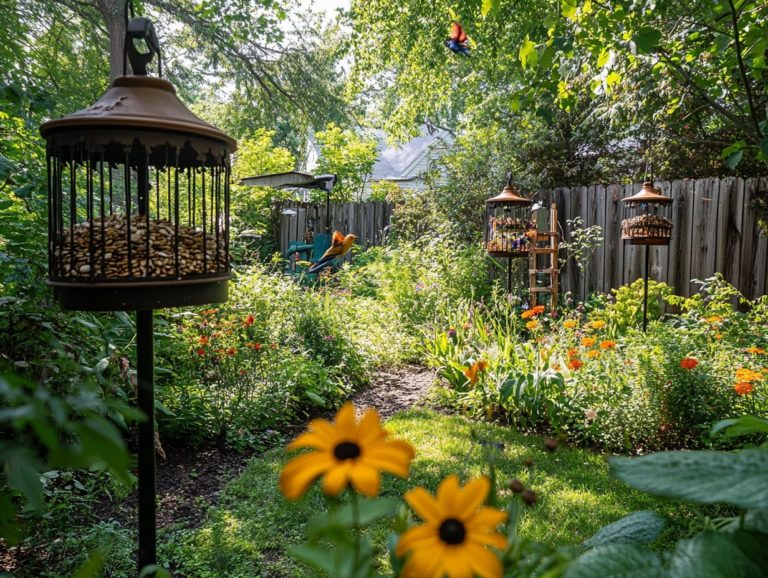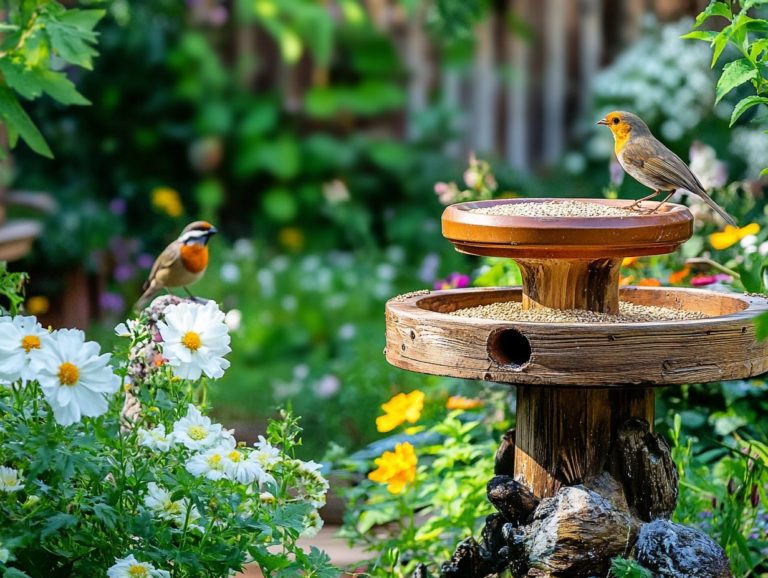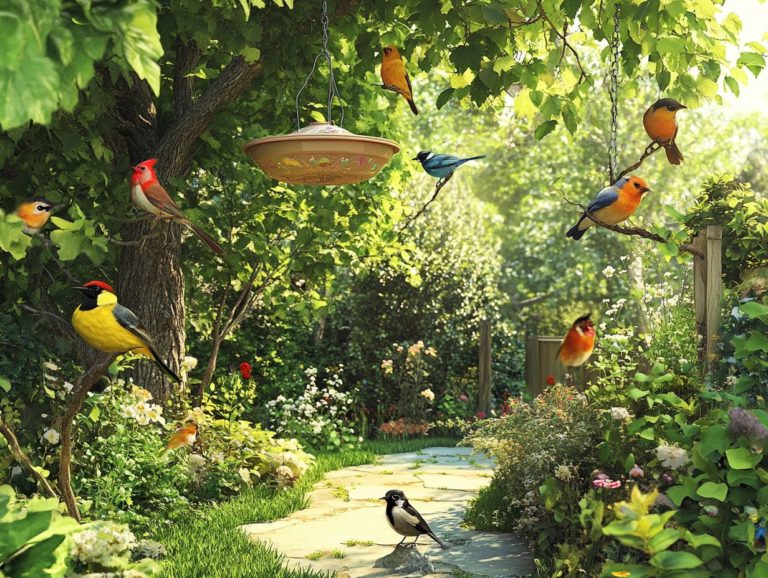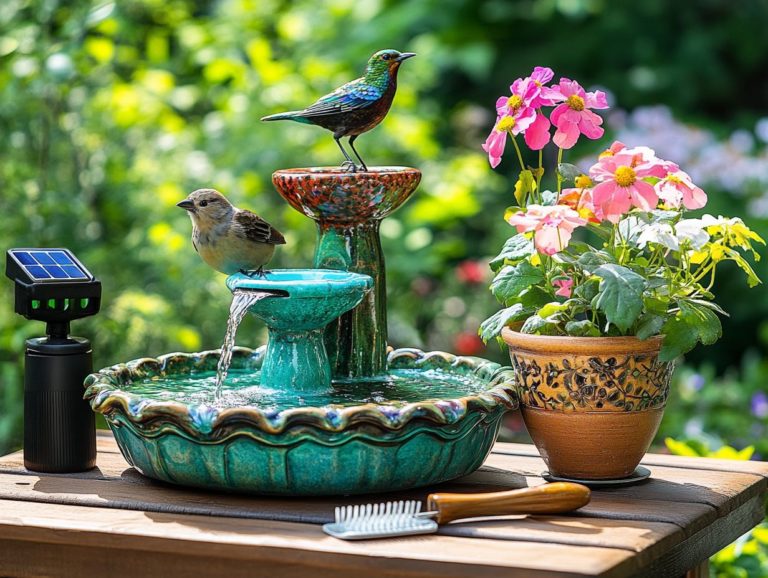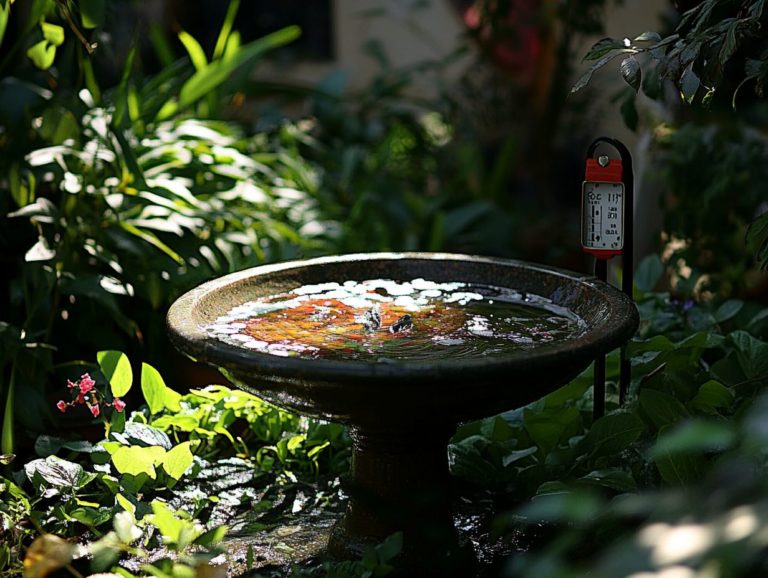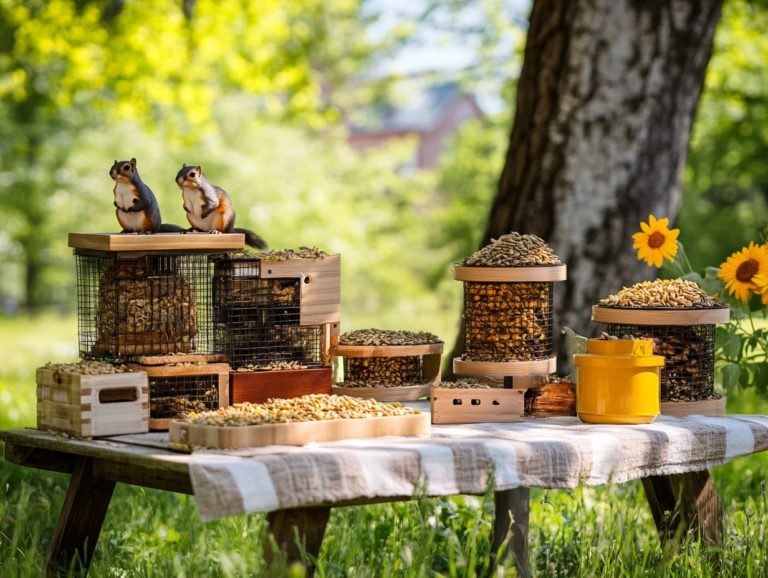How to Keep Squirrels Away from Bird Feeders
If you have a passion for birdwatching but find yourself exasperated by those persistent squirrels raiding your feeders, know that you re in good company.
These nimble little critters are naturally drawn to bird feeders, presenting quite the problem for dedicated bird enthusiasts. This article delves into the reasons behind squirrels attraction to these setups and offers effective strategies to keep them at bay.
From implementing physical barriers and natural deterrents to crafting DIY repellents and investing in squirrel-proof feeders, you ll uncover practical tips to ensure your feathered friends receive their fair share. Moreover, we ll explore how to create alternative feeding options for squirrels, allowing everyone to enjoy their meals harmoniously.
Contents
- Key Takeaways:
- Understanding the Behavior of Squirrels
- Methods for Keeping Squirrels Away
- DIY Squirrel Repellents
- Choosing Squirrel-Proof Bird Feeders
- Alternative Feeding Options for Squirrels
- Simple Tips to Keep Squirrels Away
- Frequently Asked Questions
- 1. How can I keep squirrels away from my bird feeders?
- 2. Is there a specific bird feeder that is more squirrel-proof than others?
- 3. Can I use cayenne pepper to keep squirrels away from my bird feeders?
- 4. How often should I clean my bird feeder to keep squirrels away?
- 5. What should I do if I see a squirrel on my bird feeder?
- 6. Are there any natural ways to keep squirrels away from my bird feeder?
Key Takeaways:
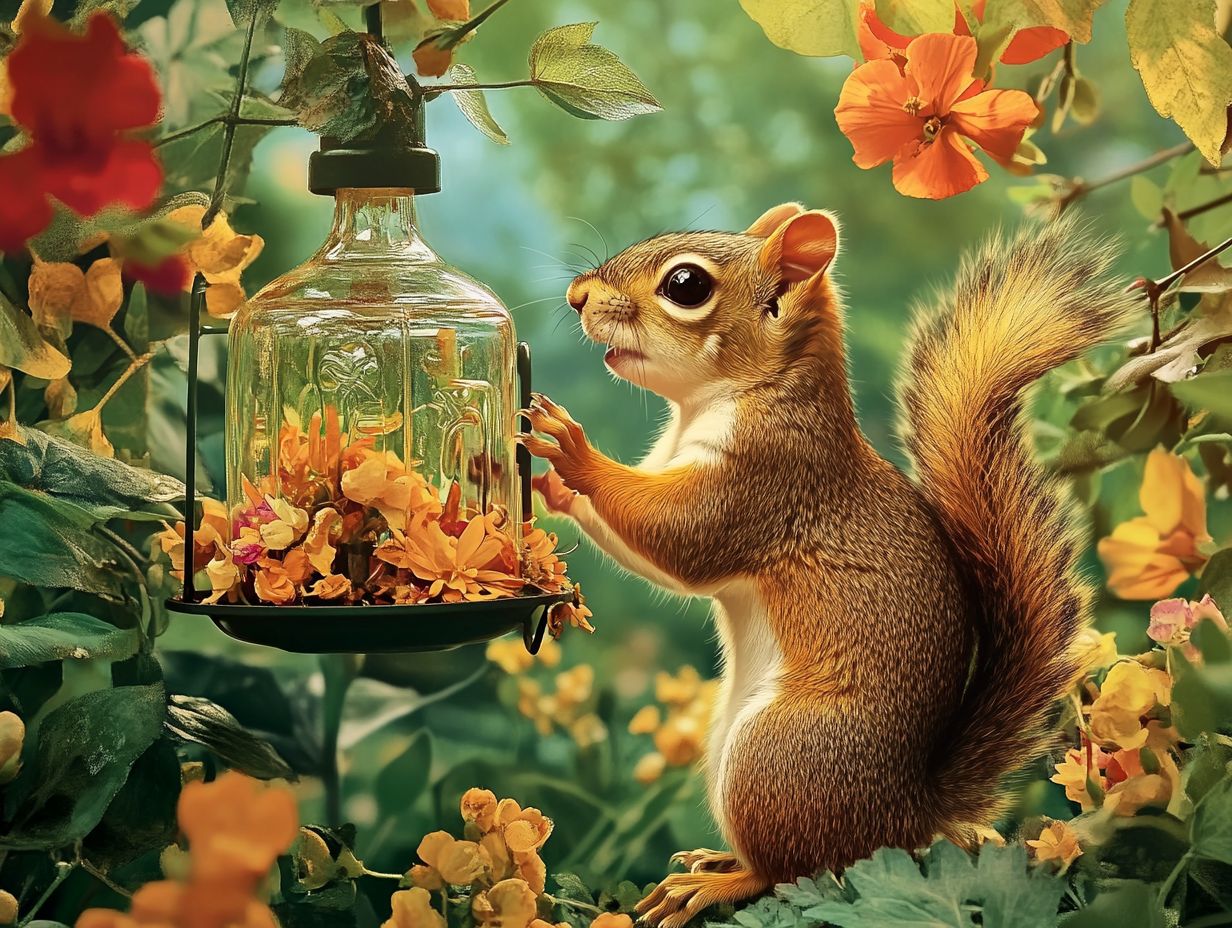
- Understand squirrel behavior to effectively deter them from bird feeders.
- Use physical barriers and natural deterrents to keep squirrels away from bird feeders.
- Consider squirrel-proof feeders and provide alternative feeding options as additional measures to prevent squirrel disturbances.
Understanding the Behavior of Squirrels
Understanding squirrel behavior is essential for homeowners, bird enthusiasts, and ecologists, particularly in suburban areas where these agile little creatures frequently raid bird feeders in search of an easy meal.
Squirrels, with their curious and resourceful tendencies, will seize any chance to access the seeds in your feeders. This can disrupt your bird-watching experience and impact the local ecosystem.
By looking into squirrel behavior, you can uncover their motivations and interactions with feeders. This knowledge equips you with effective strategies to manage their presence in your yard while fostering a healthy environment for local birds like cardinals, blue jays, and warblers.
Why Squirrels are Attracted to Bird Feeders
Squirrels can t resist the allure of bird feeders. They are drawn in by a treasure trove of seeds especially safflower seeds and other nutrient-rich foods that cater to their nutritional cravings, particularly during seasonal shifts when natural food becomes scarce.
As autumn transitions to winter, trees shed their leaves, leaving these clever critters with limited foraging opportunities. In this context, bird feeders stocked with sunflower seeds and peanuts become a veritable feast. For a clever twist, consider adding hot pepper or cayenne pepper to your seed mixes; squirrels are not fans of the heat, making it an effective deterrent.
Meanwhile, if you re passionate about attracting backyard birds like finches and cardinals without inviting those furry intruders, look for feeder designs that only allow birds to eat, like weight-activated mechanisms or squirrel-proof cages. With a thoughtful selection, you can cultivate a harmonious space that delights both local birds and those ever-curious squirrels!
Methods for Keeping Squirrels Away
Keeping squirrels at bay from your bird feeders can be quite the challenge, especially for avid bird watchers and garden enthusiasts like you. These crafty rodents have a knack for finding ways to pilfer food, making effective deterrents absolutely essential.
By implementing squirrel-proof strategies such as using squirrel baffles and setting up obstacle courses you can successfully discourage their unwelcome visits. Regularly cleaning your feeders helps create a bird-friendly environment.
Embracing these methods not only enhances your enjoyment of feeding wild birds but also minimizes the competition for those precious seeds. Your feathered friends will thank you!
Physical Barriers
Consider incorporating physical barriers such as squirrel-proof feeders and squirrel baffles to safeguard your bird seed from these relentless foragers. Local birds like cardinals and blue jays can enjoy their meals without competition from squirrels.
These barriers come in various designs. Squirrel-proof feeders equipped with weight-sensitive mechanisms cleverly shut off access when a heavier creature attempts to feed. For an extra layer of protection, squirrel baffles can be added to feeder poles, serving as effective shields against unwanted intrusions.
The real magic happens when you utilize both products together, creating a robust multi-layered defense against these clever critters.
Features like adjustable heights and weather-resistant materials add to their reliability. This makes them an excellent choice for bird enthusiasts who wish to relish a peaceful feeding experience without the usual interruptions.
Natural Deterrents
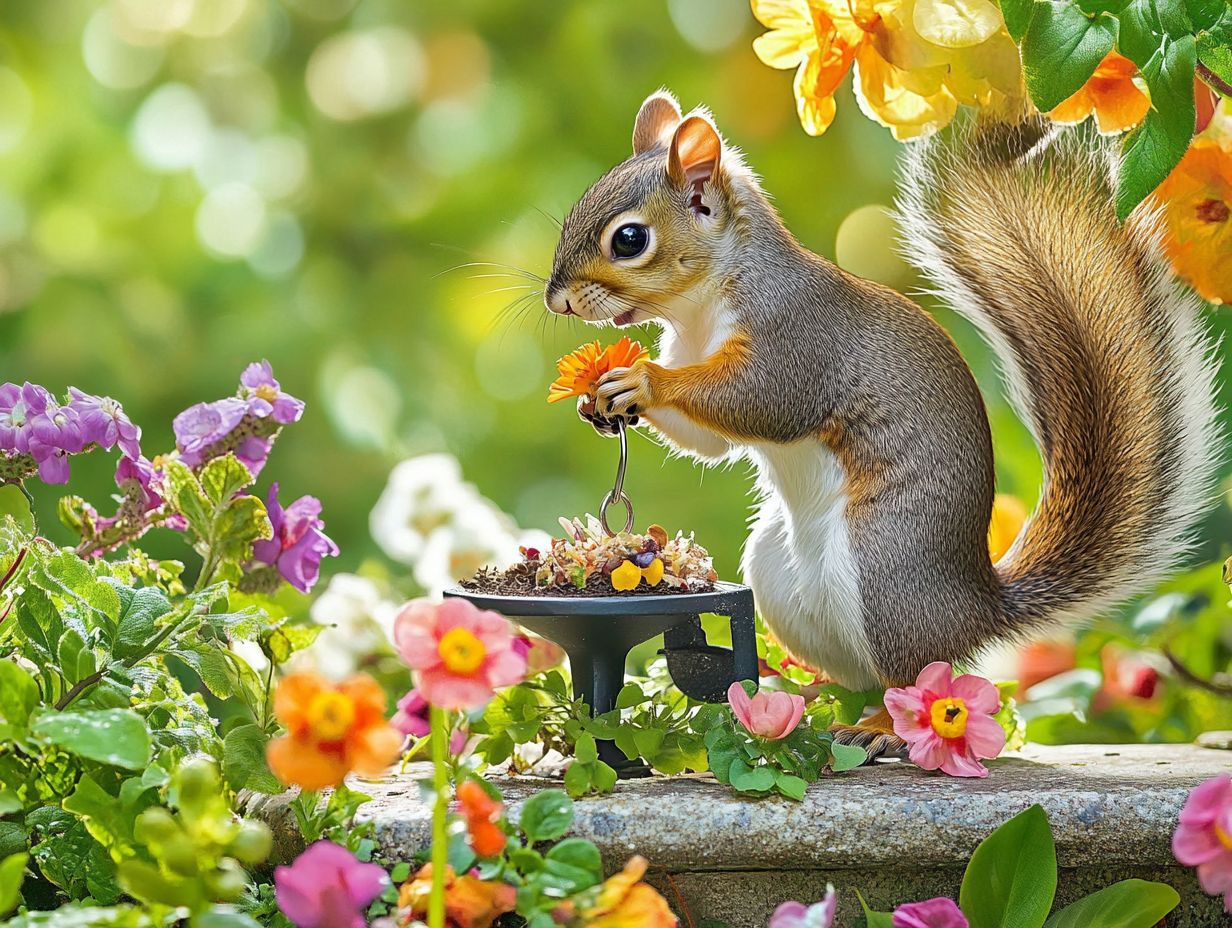
Natural deterrents like hot pepper and cayenne pepper can effectively discourage squirrels from raiding your bird feeders while still attracting local birds, such as woodpeckers and chickadees that favor safflower seeds.
These spicy ingredients offer a unique sensory experience for the birds, who are blissfully unaffected by the heat. This allows them to dine without the nuisance of pesky squirrels pilfering their food.
The secret to this method’s success lies in the natural chemicals present in these peppers, which repel unwanted critters while keeping your feathered friends safe and sound.
To maximize bird attraction, it’s crucial to clean your feeders regularly. This removes any residues that might discourage birds and diminish their feeding enthusiasm. Regular cleaning creates a healthier feeding area, ensuring your birds enjoy every meal!
DIY Squirrel Repellents
Crafting your own DIY squirrel repellents can be an effective and cost-efficient strategy for gardeners or bird enthusiasts looking to safeguard their bird feeders from those clever little critters. Don’t wait start crafting these effective squirrel repellents today!
Using ingredients like cayenne pepper and hot pepper oil, you can deter squirrels while keeping your feathered friends safe. These homemade solutions minimize reliance on commercial products and enable you to tailor your feeding environments, fostering vibrant and healthy bird activity.
Homemade Solutions for Keeping Squirrels at Bay
Homemade solutions for keeping squirrels at bay often involve mixing cayenne pepper and hot pepper oil into birdseed or creating sprays to coat feeders. This significantly reduces squirrel access while ensuring that local birds can still enjoy their meals.
It’s vital to maintain a clean feeding environment by regularly removing spilled seeds and debris that might attract wildlife.
For a more potent deterrent, consider blending water with crushed garlic and dish soap into a spray. The strong scent will be off-putting to squirrels, giving your birds a better chance at uninterrupted dining.
Apply these mixtures weekly, particularly during peak feeding times like early morning and late afternoon. Timing your application enhances the likelihood of keeping those unwanted visitors at bay, allowing your feathered friends to feast in peace.
Choosing Squirrel-Proof Bird Feeders
Selecting squirrel-proof bird feeders is crucial for bird enthusiasts who want to safeguard their seed investments from the crafty antics of squirrels. Choosing the right features profoundly enhances your bird-watching experience.
The best feeders come equipped with mechanisms that effectively block squirrel access while providing a safe feeding environment for a diverse array of birds. This strikes a perfect balance between easy maintenance and fostering a vibrant backyard ecosystem.
Features to Look for in a Squirrel-Proof Feeder
When choosing a squirrel-proof bird feeder, keep several key features in mind:
- Robust construction materials
- Effective weight distribution systems
- Designs that thwart squirrels while attracting a variety of bird species like warblers, woodpeckers, and chickadees.
An effective feeder often uses metal or durable plastics that withstand harsh weather and determined nibbling. Many models feature adjustable perches that close off access when heavier animals try to eat, cleverly deterring pesky squirrels without scaring off smaller birds.
A well-designed feeder makes refilling and cleaning easy, featuring removable trays and drainage holes to keep seeds dry and fresh. These thoughtful details simplify maintenance and enhance the feeding environment, benefiting local bird populations by ensuring they have reliable sources of nourishment.
Alternative Feeding Options for Squirrels
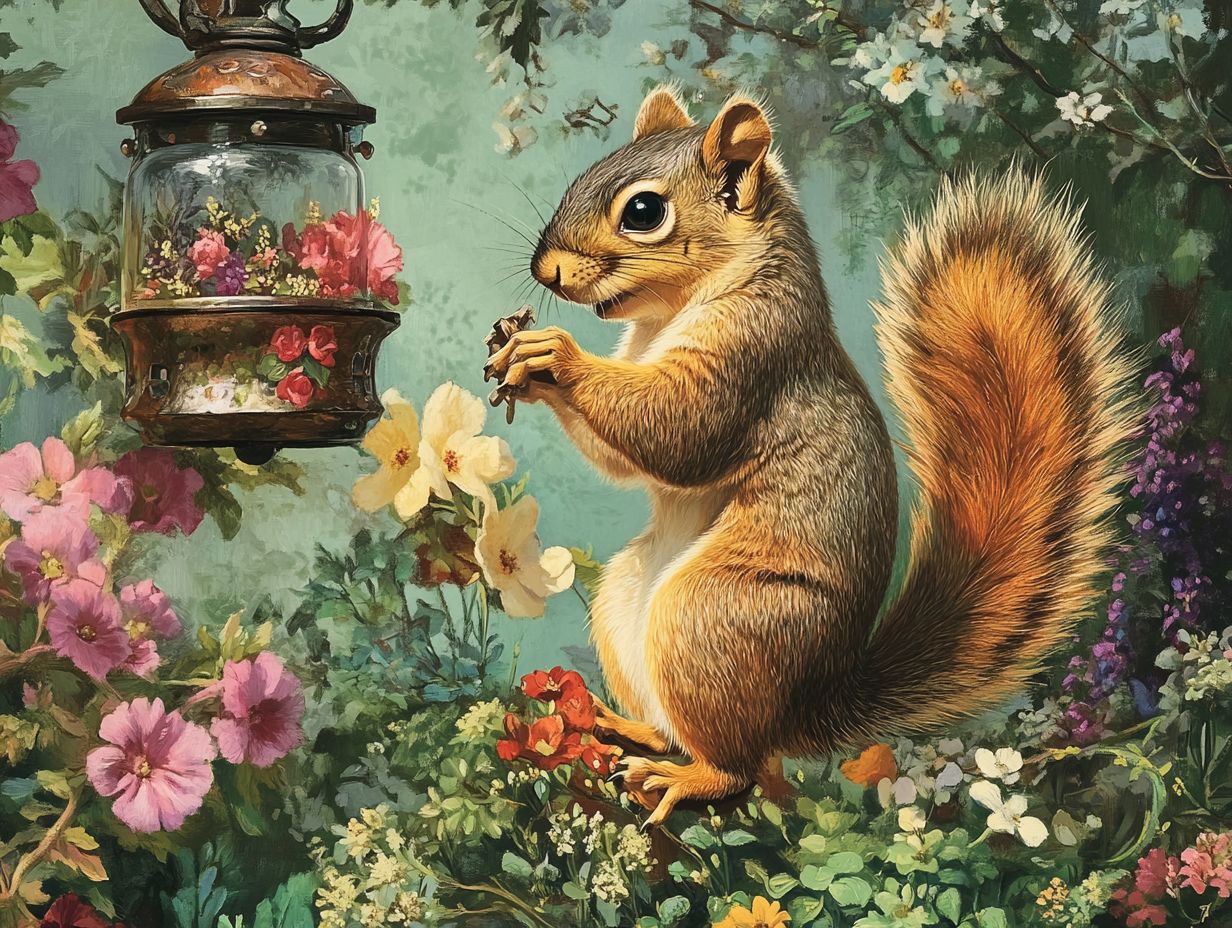
Offering alternative feeding options for squirrels, such as dedicated squirrel feeders, can significantly reduce competition at your bird feeders and create a harmonious environment in your yard.
By setting up dedicated squirrel feeders filled with carefully selected foods like corn and nuts, you can limit their disruption during bird feeding times while still enjoying the lively presence of these charming creatures.
This thoughtful approach ensures that both birds and squirrels have their nutritional needs met, creating a balanced ecosystem right outside your window.
Providing a Separate Feeding Station for Squirrels
Establishing a dedicated feeding station for squirrels minimizes their competition with birds at traditional feeders. This special space allows squirrels to indulge in their favorite treats like corn, seeds, and nuts without interrupting the bird-feeding experience.
This arrangement not only adds to your backyard’s charm but also promotes a healthier squirrel population. Ideally, place the feeding station in a quiet corner of your yard, away from busy areas, and close to natural cover like trees or shrubs.
Opt for a weather-resistant design that provides sheltered spots for the food while ensuring easy access for squirrels. Offering a variety balancing nuts with fruits or vegetables will help deliver essential nutrients.
Regularly monitor and maintain cleanliness to prevent mold and pests; refilling food supplies keeps these lively critters entertained, fostering a harmonious coexistence in your garden.
Simple Tips to Keep Squirrels Away
To effectively keep squirrels away from your bird feeders, adopt a blend of regular maintenance, vigilant monitoring, and strategic feeding practices. This approach allows both birds and squirrels to coexist peacefully in your yard.
Implementing these tips enhances the feeding experience for local avian visitors and minimizes pesky squirrel interference, fostering a harmonious environment in your suburban oasis.
Maintenance and Monitoring Strategies
Regular maintenance and monitoring are essential for ensuring your bird feeders effectively nourish local birds while keeping pesky squirrels at bay, enhancing the overall feeding experience in your yard.
To achieve this, establish a consistent cleaning schedule. This practice helps prevent mold and bacteria build-up that could compromise the birds’ health. Routinely inspect the condition of your feeders to catch any wear and tear early, ensuring that the feed remains fresh and accessible.
Proactive adjustments like using squirrel-proof feeders or strategically placed baffles can significantly deter unwanted visitors. Observing wildlife behavior is equally important; by noting feeding patterns and squirrel activities, you can fine-tune your maintenance strategies over time.
This approach fosters a thriving bird population and creates a more enjoyable backyard sanctuary.
Get started today and transform your backyard into a bird paradise!
Frequently Asked Questions
1. How can I keep squirrels away from my bird feeders?
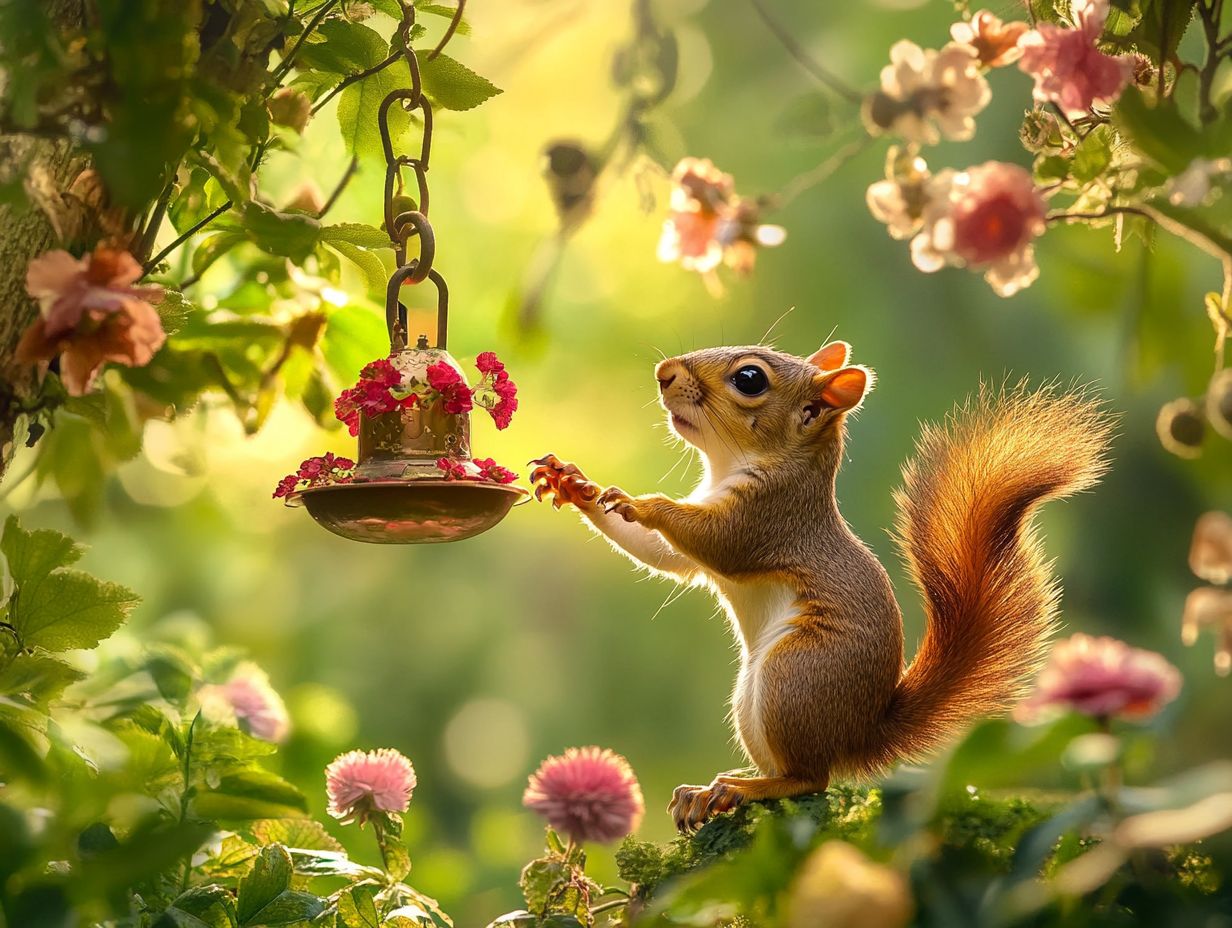
To keep those pesky squirrels at bay, you can use a squirrel-proof feeder or place a barrier on the feeder pole. You can also try using a squirrel repellent spray. Creating a barrier around the feeder with mesh or chicken wire can help as well.
2. Is there a specific bird feeder that is more squirrel-proof than others?
Yes! Some bird feeders are designed specifically to be squirrel-proof. These usually have metal cages or weight-activated perches, which means the feeder closes when something heavy, like a squirrel, sits on it. This prevents them from accessing the food.
3. Can I use cayenne pepper to keep squirrels away from my bird feeders?
Yes, cayenne pepper can be an effective squirrel repellent. You can sprinkle it around the base of the feeder or mix it in with the birdseed. Be cautious, though, as it may also deter birds.
4. How often should I clean my bird feeder to keep squirrels away?
It s recommended to clean your bird feeder at least once a month. This prevents the buildup of food and debris that might attract squirrels. Also, clean the area around the feeder to ensure no fallen seeds or droppings are luring them in.
5. What should I do if I see a squirrel on my bird feeder?
If you spot a squirrel on your bird feeder, try scaring it away by making loud noises or spraying it with water. You can also take down the feeder temporarily and put it back later when the squirrel has moved on.
6. Are there any natural ways to keep squirrels away from my bird feeder?
Absolutely! You can use natural deterrents like planting certain herbs, such as mint or lavender, around your feeder. Hanging aluminum foil strips or a fake owl or snake nearby can also scare away squirrels.

